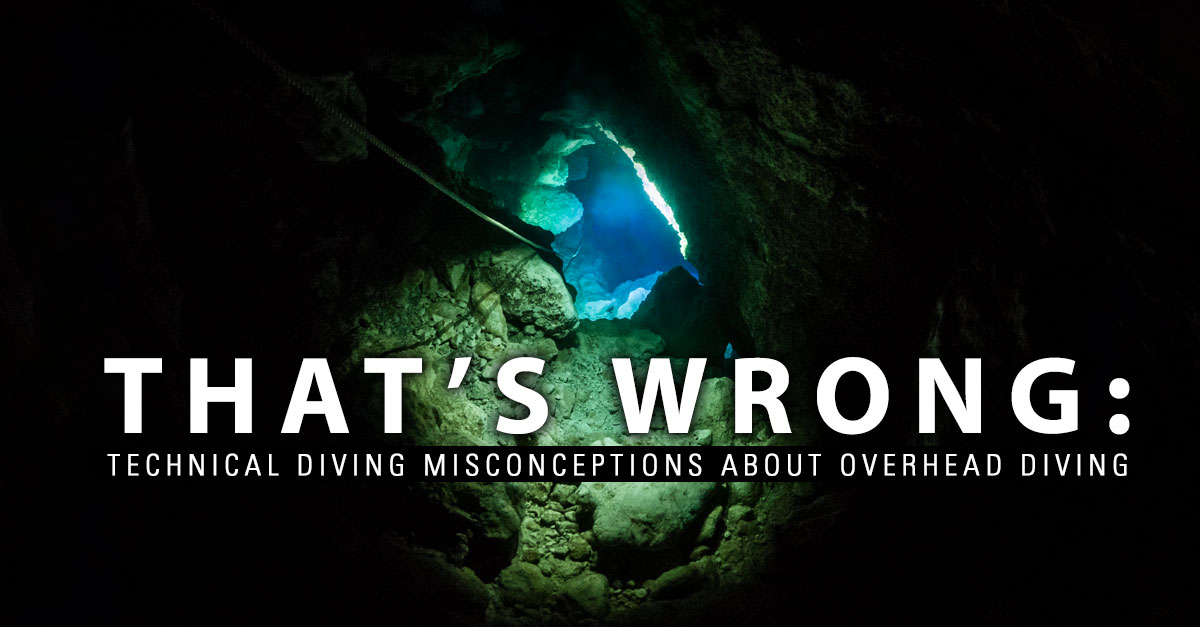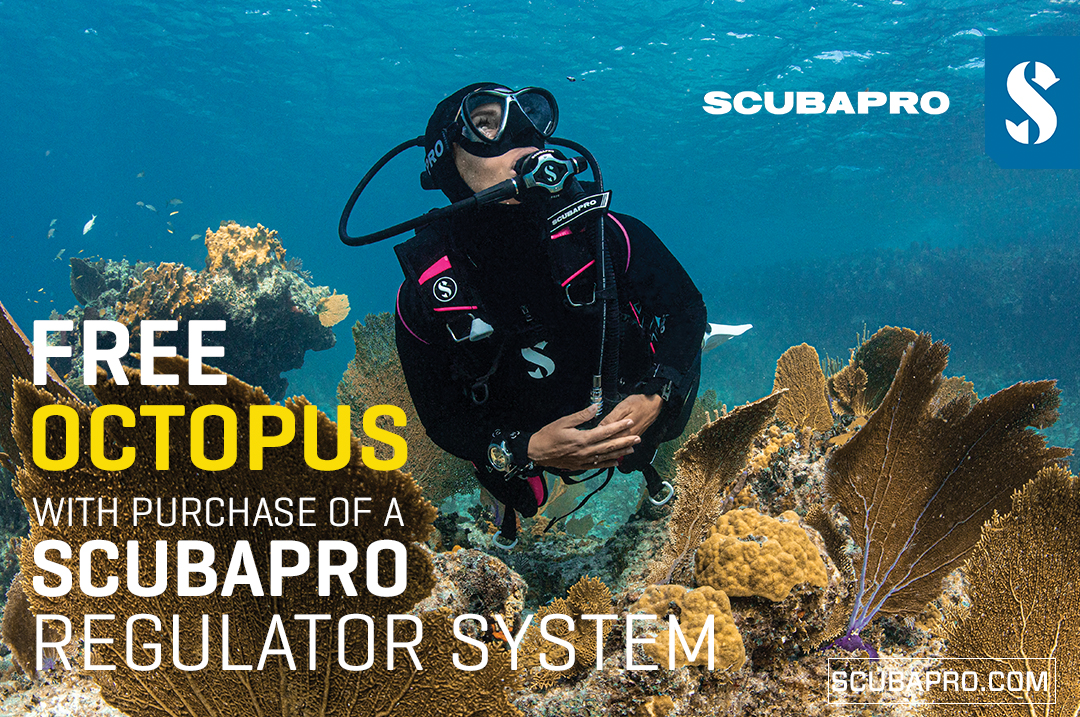News
That’s wrong: misconceptions about overhead diving

By: John Bentley & Brian Shreve
The interwebs are a great place to pick up some great, and some not so great, information. Internet cave divers seem to enjoy spouting off opinions based loosely on nothing. This is particularly scary considering the fragility of the cave community and the necessity for standardization in cave diving. Spend a little time on the various scuba related websites, and it’s amazing some of the just plain wrong things you can read!
Here are just a few of them we’ve recently found:
The Rule of 1/6th isn’t appropriate for gaining real experience
This is, unfortunately, a popular one in the North Florida area: The idea that 1/6th doesn’t give the Intro Cave diver enough distance to utilize their newfound awareness, conservation and buddy skills. That’s just not the case. 1/6th gives adequate gas, even for the biggest gas guzzler, to get acquainted to a cave system in a way that exposes them to overhead stress with emphasis on line awareness, buddy procedures, communication, and gas management. It essentially eliminates navigation stress through mainline navigation only, reduces time/distance stress and eliminates most decompression obligation stress.
If 1/6th diver’s gas consumption rates aren’t adequate for getting a few hundred feet into the cave that shows that their comfort level, fitness, and streamlining are not to the level needed to be that far into a cave anyway. While all divers breathe at different rates, and that’s a physiological issue, even the best trained divers double their gas consumption rate under stress. Putting a high volume breather further into a cave without mastery of stress management is asking for trouble.
Visual Jumps are OK
It’s only 3 feet!
This cave never silts out!
I’m familiar with this passage…
Holy moley, no! This one defines all logic. The time it takes to install a jump or gap, a matter of seconds, nullifies all reasons that this would be ok. All overhead dives should be planned for a total loss of visibility, whether through siltation, total light failure or mask loss. If viz is gone finding the gap will be difficult, objectively more difficult than following a line.
Primary lines are optional in tourist caves
This system will spit me out if I’m lost!
Close to open water is close enough!
This one goes back to the previous point. Just no! Tourist caves, like Ginnie and Peacock, that don’t have a line that goes to open water, are no safer than a virgin system. A cavern full of students can quickly make Peacock impossible to navigate. Plenty of individuals have perished in the forward section of a system because they couldn’t clearly find an exit. Just to clarify – If you’re in trouble, running low on gas after a reg failure in low vizibility, do you really want to hit the end of the line, let go, and hope for Mama Ginnie to spit you out? If the answer to that is yes: please, please, take up racquetball instead of cave diving.
It annoys everyone when caverns are a mess of lines, and yes, sometimes that makes it more dangerous. The only solution for a clear exit, where the line runs to the open water, is for cave divers to speak up and have lines extended to open water. This is an issue with land owners not properly restricting access to non-overhead divers. If the site is not open water appropriate (Ginnie for example) then it needs to be restricted to overhead divers only and the guideline should be extended to open water to prevent too many lines. Issues like this are very isolated to certain sites in North Florida and, despite the ease of fix, have spawned an alternate pattern of thinking towards continuous guidelines in cave diving. While every cave is unique and beautiful no cave merits entry without the ability to very easily navigate to the surface with visibility loss.
The Rule of 1/3rds is always appropriate
This is normalization of deviance at its best. The rule of thirds is not always appropriate. When exerted you will use substantially more gas. Long strenuous swims using substantially more gas, or possibly gas sharing, will not work with the rule of thirds. Stages do cause drag and aren’t always appropriate but with long swims in low flow systems they’re a necessary parachute. The “Grand Traverse” in Peacock is often done on thirds and while that seems appropriate to some the margin for error is little with only the gas in a couple sets of mains. A setup dive for longer swims or scooters should include a stage cylinder(s) drop for use as a safety cylinder. This goes back to the basics of dive planning and gas management. We’ve seemed to have forgotten that there are reasons behind the 1/3 rule.
These are just a sample of researched and proven techniques being put to the wayside for stories being shared between divers. The data pools aren’t huge in cave diving, but they’re large enough to set our safety standards. Ignoring these basic guidelines puts us all at risk.
To find out more about International Training, visit www.tdisdi.com.

News
Dive Worldwide Announces Bite-Back as its Charity of the Year

Over the next 12 months, specialist scuba holiday company Dive Worldwide will be supporting Bite-Back Shark & Marine Conservation with donations collected from client bookings to any one of its stunning dive destinations around the world. The independently-owned operator expects to raise £3000 for the UK charity.
Manager at Dive Worldwide, Phil North, said: “We’re especially excited to work with Bite-Back and support its intelligent, creative and results-driven campaigns to end the UK trade in shark products and prompt a change in attitudes to the ocean’s most maligned inhabitant.”
Bite-Back is running campaigns to hold the media to account on the way it reports shark news along with a brand new nationwide education programme. Last year the charity was credited for spearheading a UK ban on the import and export of shark fins.
Campaign director at Bite-Back, Graham Buckingham, said: “We’re enormously grateful to Dive Worldwide for choosing to support Bite-Back. The company’s commitment to conservation helps set it apart from other tour operators and we’re certain its clients admire and respect that policy. For us, the affiliation is huge and helps us look to the future with confidence we can deliver against key conservation programmes.”
To launch the fundraising initiative, Phil North presented Graham Buckingham with a cheque for £1,000.
Visit Dive Worldwide to discover its diverse range of international scuba adventures and visit Bite-Back to learn more about the charity’s campaigns.
MORE INFORMATION
Call Graham Buckingham on 07810 454 266 or email graham@bite-back.com
Gear News
Scubapro Free Octopus Promotion 2024

Free Octopus with every purchase of a SCUBAPRO regulator system
Just in time for the spring season, divers can save money with the FREE OCTOPUS SPRING PROMOTION! Until July 31st SCUBAPRO offers an Octopus for free
with every purchase of a regulator system!
Get a free S270 OCTOPUS with purchase of these combinations:
MK25 EVO or MK19 EVO with A700
MK25 EVO or MK19 EVO with S620Ti
MK25 EVO or MK19 EVO with D420
MK25 EVO Din mit S620Ti-X
Get a free R105 OCTOPUS with purchase of the following combinations:
MK25 EVO or MK19 EVO with G260
MK25 EVO or MK17 EVO with S600
SCUBAPRO offers a 30-year first owner warranty on all regulators, with a revision period of two years or 100 dives. All SCUBAPRO regulators are of course certified according to the new European test standard EN250-2014.
Available at participating SCUBAPRO dealers. Promotion may not be available in all regions. Find an authorized SCUBAPRO Dealer at scubapro.com.
More information available on www.scubapro.com.
-

 News3 months ago
News3 months agoHone your underwater photography skills with Alphamarine Photography at Red Sea Diving Safari in March
-

 News3 months ago
News3 months agoCapturing Critters in Lembeh Underwater Photography Workshop 2024: Event Roundup
-

 Marine Life & Conservation Blogs3 months ago
Marine Life & Conservation Blogs3 months agoCreature Feature: Swell Sharks
-

 Blogs2 months ago
Blogs2 months agoMurex Resorts: Passport to Paradise!
-

 Blogs2 months ago
Blogs2 months agoDiver Discovering Whale Skeletons Beneath Ice Judged World’s Best Underwater Photograph
-

 Gear Reviews2 weeks ago
Gear Reviews2 weeks agoGEAR REVIEW – Revolutionising Diving Comfort: The Sharkskin T2 Chillproof Suit
-

 Marine Life & Conservation2 months ago
Marine Life & Conservation2 months agoSave the Manatee Club launches brand new webcams at Silver Springs State Park, Florida
-

 Gear Reviews3 months ago
Gear Reviews3 months agoGear Review: Oceanic+ Dive Housing for iPhone
















